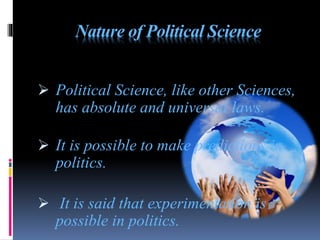Discuss the nature and scope of political science

Political science is a social science discipline that studies the theory and practice of government, politics, and governance. It explores the structures, processes, and behaviors involved in the distribution and exercise of power, as well as the impact of political systems on societies. The nature and scope of political science encompass a broad and dynamic field of study, touching upon various aspects of political life.
Nature of Political Science:
-
Interdisciplinary Nature:
- Political science draws from other disciplines such as sociology, history, economics, philosophy, and law. It integrates insights and methodologies to gain a comprehensive understanding of political phenomena.
-
Empirical and Normative:
- Political science combines empirical analysis (based on observation, data, and facts) with normative inquiry (evaluation of values and ideals). It seeks to understand both how political systems operate and how they ought to function based on ethical principles.
-
Focus on Power and Governance:
- Central to political science is the examination of power relationships, the distribution of authority, and the functioning of governmental institutions. It delves into the dynamics of decision-making and policy implementation.
-
Global Perspective:
- Political science has a global focus, studying political systems at various levels, from local governments to international relations. It analyzes the interactions between states, the role of international organizations, and the impact of globalization.
-
Dynamic and Evolving:
- Political science adapts to changing social, economic, and technological conditions. It evolves to address emerging issues such as environmental politics, human rights, cybersecurity, and the implications of technological advancements on governance.
Scope of Political Science:
-
Political Theory:
- Examines fundamental concepts, values, and ideas underlying political systems. It addresses questions related to justice, authority, and the role of the state.
-
Comparative Politics:
- Compares political systems, institutions, and practices across different countries. It seeks to identify patterns, differences, and trends in political behavior and governance.
-
International Relations:
- Focuses on the interactions between sovereign states, international organizations, and non-state actors. It explores issues such as diplomacy, conflict, cooperation, and global governance.
-
Political Economy:
- Studies the relationship between politics and economics. It examines how political institutions and processes impact economic policies and outcomes.
-
Public Administration:
- Analyzes the organization and functioning of government agencies and the implementation of public policies. It explores issues of bureaucracy, public service, and administrative efficiency.
-
Political Methodology:
- Develops and applies research methods, statistical tools, and models to study political phenomena. It involves the use of both qualitative and quantitative research techniques.
-
Policy Studies:
- Investigates the formulation, implementation, and evaluation of public policies. It examines the impact of policies on societies and individuals.
-
Political Sociology:
- Explores the sociological aspects of politics, including the study of political culture, social movements, and the relationship between political and social structures.
-
Environmental Politics:
- Addresses the political dimensions of environmental issues, including policy responses, international cooperation, and the role of political institutions in environmental governance.
The scope of political science is vast and continually expanding as new challenges and opportunities arise in the political arena. Scholars in political science contribute to our understanding of governance and society, providing insights that inform public policy, international relations, and political decision-making.
Thank you.
